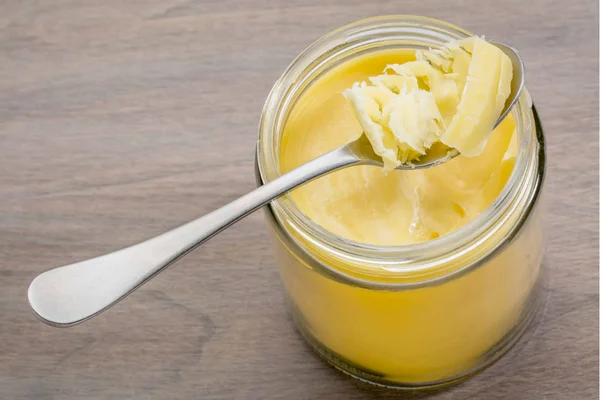This article will discuss the vegan alternatives for ghee and vegan ghee recipe, which give you better alternatives to use in your cooking, preparation, and consumption with ethical dilemmas in mind.
Ghee is very popular in Indian kitchens. The main ingredient of this food is butter, usually cow’s or sometimes buffalo’s butter.
Ghee has many health benefits from cooking with it because it contains high levels of fats (sometimes higher than could be found in a lot of oils) and other nutrients.
In addition, ghee has a high burning temperature, and its fat composition makes it stable when exposed to higher temperatures for better deep frying.
However, the production process of ghee includes animal products, so many people opt out of using ghee due to potential ethical dilemmas.
Some vegan alternatives are coconut oil or olive oil, for example, for their own cooking purposes, but vegan sweets can be difficult without dairy ingredients like milk or cream.
The only alternative for vegan cooking of oils and fats is to use an oil from a plant source like coconut oil, olive oil, or avocado oil.
This substitution is not very ideal since those oils are usually very expensive and contain high amounts of saturated fat that may increase blood cholesterol levels.
What Is The Vegan Substitute For Ghee?
You can use coconut oil or olive oil to make vegan ghee. You can also use sunflower oil or avocado oil since the latter are easily extracted from the fruit but have a relatively short shelf life and, for this reason, may not be ideal for vegan cooking
Dairy Free Vegan Ghee Recipe
Prepare Time: 5 minutes
Cook Time: 30 minutes
Yield: 60 Teaspoons
Recipe Ingredients
- 3 cups edible coconut oil
- ¼ teaspoon turmeric powder
- ¼ teaspoon asafoetida
- 5 curry leaves
- 4 guava leaves
- Salt To Taste
Step By Step Instructions
You can make your own dairy-free ghee recipe by following these steps:
Step-1: Take coconut oil in a big bowl, and add turmeric, asafoetida, curry leaves, guava leaves, and salt to taste. Mix the ingredients thoroughly.
Step-2: Place a big pot over medium heat and pour the ingredients into it. Cook while occasionally stirring until all the water content has evaporated and you are left with just a paste of yellow oil.
Step-3: When it starts to leave the sides of the pot, take it from heat and allow it to cool for a few minutes before transferring it into a bottle or container.
Nutrition Facts Per 100ml
| Nutrition | Amount |
|---|---|
| Calories | 108 |
| Fat | 9.5g |
| Saturated Fat | 1.1g |
| Cholesterol | 7mg |
| Sodium | 32mg |
How Should I Serve Vegan Ghee?
The best way to serve vegan ghee is to use it in your cooking. You can use this product in place of ordinary butter or ghee and get many benefits from it.
Vegan ghee is also very beneficial for making sweets for diabetics or those who are on a low-carb diet.

Is Vegan Ghee Healthy?
Vegan ghee has many health benefits, including the following:
- It can help you lose excess weight. This is because it contains no cholesterol and, therefore, not many calories. However, this might not be true when other ingredients are added to it.
- Rich in fatty acids, especially Omega 3 and 6, are necessary for a healthy brain and cardiovascular system and in treating some neurodegenerative diseases like Alzheimer’s and Parkinson’s.
- Contains vitamins A and E, which have antioxidant properties to protect your body from free radicals that could lead to premature aging or cancer.
- It can improve your blood circulation since it is rich in fats that may help prevent cholesterol from clogging blood vessels, thus improving blood circulation and aiding heart health.
- It helps in the treatment of eczema, acne, and psoriasis.
- It has anti-inflammatory properties.
Does Ghee Increase Belly Fat?
Some people may think ghee is fattening since it contains butter, but this is not true. Ghee does not increase belly fat because the butter used to produce it has been removed during the production process, and the only thing left behind is pure oil which does not have many calories in it, to begin with
Have Any Disadvantages To Eat Vegan Ghee?
There are actually negligible disadvantages to eating vegan ghee despite the fact that it contains no cholesterol. If ghee is not heated for too long, it does not have a lot of trans fats and saturated fats in it, and if you buy a good brand, there is very little chance that you will be exposed to pesticides or other harmful contaminants.
The only disadvantage would be the high price of buying this oil; however, if you compare its benefits with its price, I guarantee that you will want to buy another bottle of this oil as soon as your first supply is finished.
The Bottom Line
The fact is that there is a greater choice of vegan ghee recipes than dairy ghee in Indian kitchens. Ghee, made from butter or oil, has many health benefits, tastes great, and can be used in your cooking.
A big part of Indian cuisine relies on ghee, and if you take dairy out of your diet, it will still leave a large portion of your favorite recipes incomplete.
However, with these vegan alternatives to ghee and the vegan ghee recipe above, you can now enjoy your favorite Indian sweets or savory dishes in your new vegan diet.
- Broccoli Stuffed Chicken Breast – Easy Dinner Recipe! - January 9, 2025
- Classic Butter Tarts Recipe For Perfect Gooey Treats - January 6, 2025
- How To Make Bang Bang Chicken At Home: Step-By-Step Guide - January 5, 2025